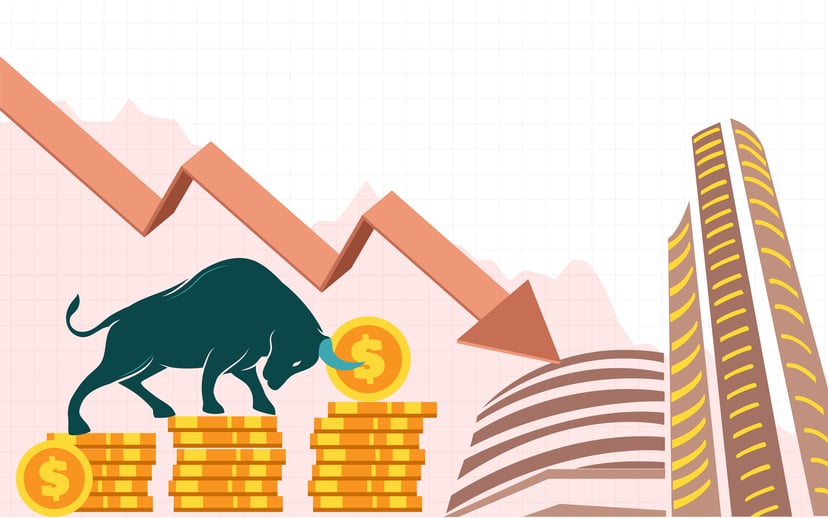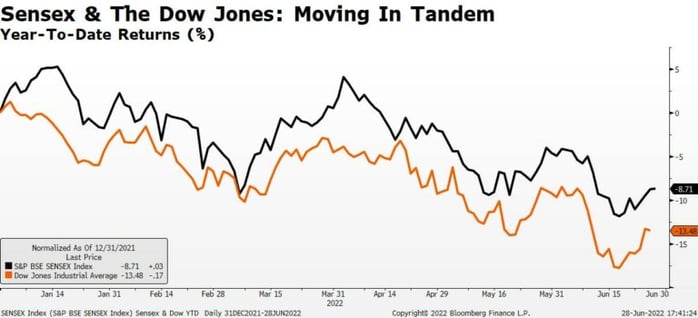The Co-Relation Between Indian Markets & Wall Street
2 minutes read

It is a tough time to invest in equities. Both Indian markets and Wall Street are in correction mode. Volatility and uncertainty are rising. But if the Dow Jones falls 1,000 points overnight, why does the Sensex in India open with significant cuts the following day? Is there a correlation between the Indian markets and Wall Street?
The Dow Jones has 11 negative weekly returns between April-June. Similarly, the Sensex has negative returns in eight of the 12 trading weeks.

Here are some reasons for the same:
Foreign Fund Outflows
Both Wall Street and Dalal Street are among the world’s largest stock exchanges. Both have an enduring impact on each other. However, the lesser the co-relation between the two, the greater the probability of a diversified portfolio.
Foreign funds’ holdings of key NSE 500 stocks are currently at 19.9%, down from the peak of 21.4%. Both Sensex & Nifty are down ~10% year-to-date.
Recession
Any slowdown in the US will affect the global economy, including India. Experts predict a recession in the US within the next 12-24 months.
In a recession-like scenario in the US, India’s services industry will be the worst hit. Services include the IT sector, the BPO, and KPO industries. The services industry contributes 52% to India’s GDP. India’s technology majors – Infosys, TCS, and Wipro, have significant exposure to North America, particularly the US.
A slowdown/recession in the US will hurt deal wins from these geographies. Lesser order wins will hurt earnings, dragging their stocks and the market lower. Accessing capital is difficult during a recession. Therefore, a recession impacts a firm’s ability to enter newer markets and limits its sales overseas due to lower demand.
Presidential Elections
India’s Sensex has dropped 2.1% on average in the five trading sessions following the last five US Presidential elections. The days preceding the election do cause some volatility in Indian markets and Wall Street.
Most of the volatility is due to uncertainty over the outcome of the election and in case there happens to be a transition, what kind of policies will the new government frame. Most impacted are drugmakers and software exporters, which derive a large share of their business from the US.
The Federal Reserve
During US Federal Reserve’s taper tantrum in 2013, India witnessed portfolio outflows worth $1.6B between May and August.
The Federal Reserve’s recent hike of 75 basis points is the most aggressive since 1994. India’s Reserve Bank of India has also been proactive, making an out-of-policy hike of 40 basis points in May before hiking another 50 basis points in June to ensure the pull-out of foreign funds is not accelerated.
India’s markets have been resilient this time compared to 2013. The S&P BSE Sensex is down 5% since May, in line with the Dow Jones, which is down 6%.
Conclusion
Both Wall Street and Dalal Street are among the world’s largest stock exchanges. Both have an enduring impact on each other. However, the lesser the co-relation between the two, the greater the probability of a diversified portfolio.
All content provided by Winvesta India Technologies Ltd. is for informational and educational purposes only and is not meant to represent trade or investment recommendations. Remember capital is at risk. Terms & Conditions apply.
Access 4500+ US Stocks and ETFs with Winvesta
Get an account in minutes and start investing as soon as today
Get StartedAll content provided by Winvesta India Technologies Ltd. is for informational and educational purposes only and is not meant to represent trade or investment recommendations. Remember capital is at risk. Terms & Conditions apply.

Contributed by Hormaz Fatakia
Hormaz is the Financial Content Lead at Winvesta. Before Winvesta, Hormaz worked at Bloomberg Quint where he was a senior writer.


